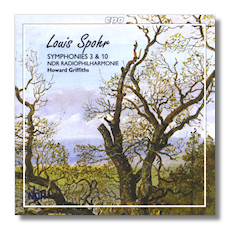
The Internet's Premier Classical Music Source
Related Links
- Spohr Reviews
- Latest Reviews
- More Reviews
-
By Composer
-
Collections
DVD & Blu-ray
Books
Concert Reviews
Articles/Interviews
Software
Audio
Search Amazon
Recommended Links
Site News
 SACD Review
SACD Review
Louis Spohr

Symphonies
- Symphony #3, in E minor, Op. 78
- Symphony #10 in E Flat Major, WoO 8
- Overture in F Major, WoO 1
North German Radio Symphony Orchestra/Howard Griffiths
CPO 777177-2 Hybrid Multichannel SACD
Louis Spohr was, like fellow composer Johann Nepomuk Hummel, overshadowed by their great contemporary Ludwig van Beethoven. (Should I be consistent and write Louis van Beethoven?) Spohr today is probably best remembered for his eighteen violin concertos, the best known of which is the Eighth, his one large work that has made it to the fringes of the standard repertory. As a symphonist he is not well known: only recently has interest in his symphonies revived, but barely. At the moment only about four or five discs of his ten symphonies are available, but that situation will change significantly over the next few years..
This CPO SACD is volume one in a complete cycle of the symphonies by Howard Griffiths and the NDR Radio Philharmonie. The two symphonies here are largely subdued, not stormy or driven in the manner of Beethoven. Spiritually, they are related to Mozart and quite melodically engaging, with orchestration that looks ahead to Schumann and Mendelssohn. The Third, at a half-hour, is both the longer and more ambitious of the two. The Tenth is very laid back and it looks backward to Classical models structurally, while featuring shorter-breathed melodies. The composer wanted to suppress it, feeling it unworthy to stand with his other nine symphonies, but it's an engaging work, filled with attractive melody and written in a style clearly exuding Spohr's individual voice.
The four-movement Third Symphony (1828) opens grimly, quite in line with the Andante Grave marking of the introduction. Things turn brighter when the main Allegro section of the exposition arrives, and for the most part the symphony remains upbeat throughout.
The Tenth, also cast in four movements, is a bit more serene and well-behaved. It occupies a place in Spohr's oeuvre similar to the 7th Symphony in Prokofieff's or the 3rd Piano Concerto in Bartók's. It's a conservative, largely modest work, in the sense that it attempts to strike out no new paths or ideas. The brief Overture (1819) makes a nice bonus here.
Will the listener find the music on this disc appealing? Rarely is there a hint of anger or angst in any of it. Many may charge it is not challenging or varied enough; others will be charmed by its melody and generally bright moods. Again, you'll hear much that foreshadows Schumann and Mendelssohn in the music, and it is quite accessible at first hearing. Howard Griffiths draws out fine performances from the NDR Radio Philharmonie and the CPO sound reproduction is excellent. If you want to explore the byways of early 19th century orchestral repertory, you may find Spohr an interesting diversion.
Copyright © 2008, Robert Cummings




















